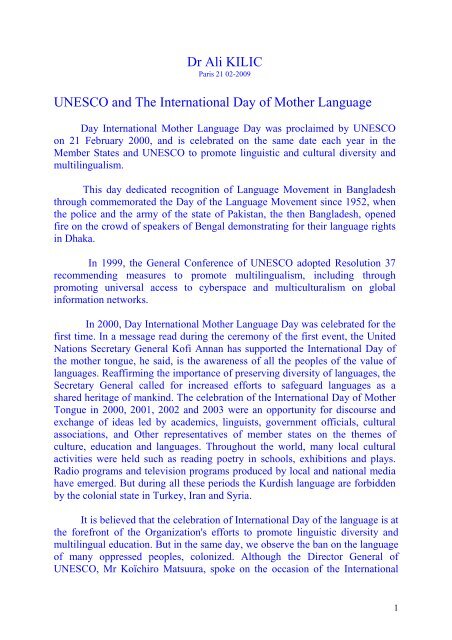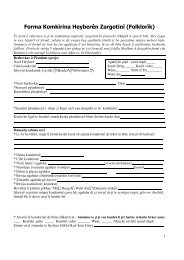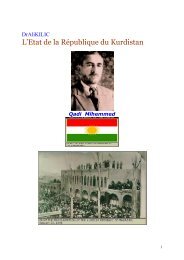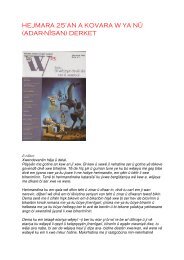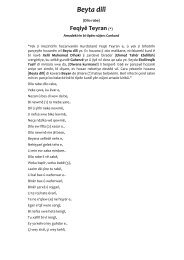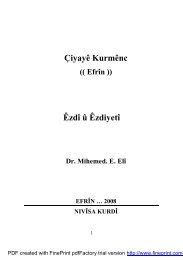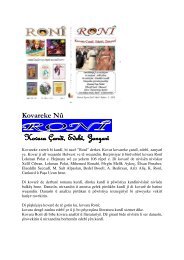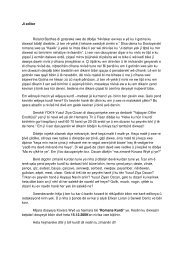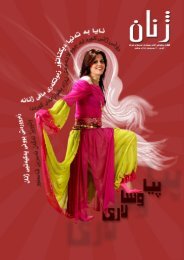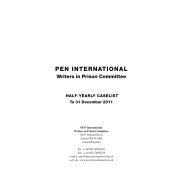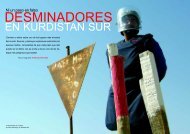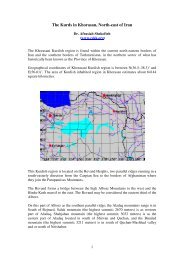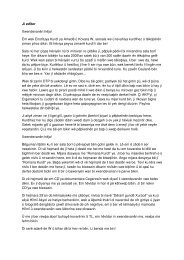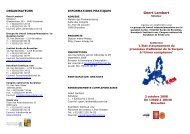UNESCO and The International Day of Mother Language - Pen-Kurd
UNESCO and The International Day of Mother Language - Pen-Kurd
UNESCO and The International Day of Mother Language - Pen-Kurd
- No tags were found...
You also want an ePaper? Increase the reach of your titles
YUMPU automatically turns print PDFs into web optimized ePapers that Google loves.
Dr Ali KILIC<br />
Paris 21 02-2009<br />
<strong>UNESCO</strong> <strong>and</strong> <strong>The</strong> <strong>International</strong> <strong>Day</strong> <strong>of</strong> <strong>Mother</strong> <strong>Language</strong><br />
<strong>Day</strong> <strong>International</strong> <strong>Mother</strong> <strong>Language</strong> <strong>Day</strong> was proclaimed by <strong>UNESCO</strong><br />
on 21 February 2000, <strong>and</strong> is celebrated on the same date each year in the<br />
Member States <strong>and</strong> <strong>UNESCO</strong> to promote linguistic <strong>and</strong> cultural diversity <strong>and</strong><br />
multilingualism.<br />
This day dedicated recognition <strong>of</strong> <strong>Language</strong> Movement in Bangladesh<br />
through commemorated the <strong>Day</strong> <strong>of</strong> the <strong>Language</strong> Movement since 1952, when<br />
the police <strong>and</strong> the army <strong>of</strong> the state <strong>of</strong> Pakistan, the then Bangladesh, opened<br />
fire on the crowd <strong>of</strong> speakers <strong>of</strong> Bengal demonstrating for their language rights<br />
in Dhaka.<br />
In 1999, the General Conference <strong>of</strong> <strong>UNESCO</strong> adopted Resolution 37<br />
recommending measures to promote multilingualism, including through<br />
promoting universal access to cyberspace <strong>and</strong> multiculturalism on global<br />
information networks.<br />
In 2000, <strong>Day</strong> <strong>International</strong> <strong>Mother</strong> <strong>Language</strong> <strong>Day</strong> was celebrated for the<br />
first time. In a message read during the ceremony <strong>of</strong> the first event, the United<br />
Nations Secretary General K<strong>of</strong>i Annan has supported the <strong>International</strong> <strong>Day</strong> <strong>of</strong><br />
the mother tongue, he said, is the awareness <strong>of</strong> all the peoples <strong>of</strong> the value <strong>of</strong><br />
languages. Reaffirming the importance <strong>of</strong> preserving diversity <strong>of</strong> languages, the<br />
Secretary General called for increased efforts to safeguard languages as a<br />
shared heritage <strong>of</strong> mankind. <strong>The</strong> celebration <strong>of</strong> the <strong>International</strong> <strong>Day</strong> <strong>of</strong> <strong>Mother</strong><br />
Tongue in 2000, 2001, 2002 <strong>and</strong> 2003 were an opportunity for discourse <strong>and</strong><br />
exchange <strong>of</strong> ideas led by academics, linguists, government <strong>of</strong>ficials, cultural<br />
associations, <strong>and</strong> Other representatives <strong>of</strong> member states on the themes <strong>of</strong><br />
culture, education <strong>and</strong> languages. Throughout the world, many local cultural<br />
activities were held such as reading poetry in schools, exhibitions <strong>and</strong> plays.<br />
Radio programs <strong>and</strong> television programs produced by local <strong>and</strong> national media<br />
have emerged. But during all these periods the <strong>Kurd</strong>ish language are forbidden<br />
by the colonial state in Turkey, Iran <strong>and</strong> Syria.<br />
It is believed that the celebration <strong>of</strong> <strong>International</strong> <strong>Day</strong> <strong>of</strong> the language is at<br />
the forefront <strong>of</strong> the Organization's efforts to promote linguistic diversity <strong>and</strong><br />
multilingual education. But in the same day, we observe the ban on the language<br />
<strong>of</strong> many oppressed peoples, colonized. Although the Director General <strong>of</strong><br />
<strong>UNESCO</strong>, Mr Koïchiro Matsuura, spoke on the occasion <strong>of</strong> the <strong>International</strong><br />
1
<strong>Mother</strong> <strong>Language</strong> <strong>Day</strong> on 21 February 2002: "Today more than ever, looking for<br />
underst<strong>and</strong>ing <strong>and</strong> recognition <strong>of</strong> other peoples <strong>of</strong> other cultures <strong>and</strong> respecting<br />
their languages <strong>and</strong> ways <strong>of</strong> thinking expressed through them. "<strong>The</strong> speech by<br />
Mr Koïchiro Matsuura, is a truth for the dominant nations, it is no other thing a<br />
lie to the oppressed nations <strong>and</strong> the countries colonized.<br />
<strong>Day</strong> <strong>International</strong> <strong>Mother</strong> <strong>Language</strong>, <strong>Day</strong> is celebrated today on 21<br />
February 2009. It marks the start <strong>of</strong> the <strong>International</strong> Year <strong>of</strong> <strong>Language</strong>s,<br />
proclaimed by the United Nations General Assembly <strong>and</strong> the coordination <strong>of</strong><br />
which has been entrusted to <strong>UNESCO</strong> as the other languages <strong>of</strong> the United<br />
Nations has not adhered to, n has never applied .. This applies to the 1960<br />
Declaration on the Granting <strong>of</strong> Independence to Colonial.<br />
<strong>The</strong> question arises why <strong>and</strong> how what are the prospects for the<br />
<strong>International</strong> <strong>Day</strong> <strong>of</strong> the mother tongue will be differentiated from native<br />
languages <strong>of</strong> the dominant nations Is it the colonial peoples that do not have<br />
states, including their mother tongues are prohibited have any rights to benefit<br />
from this international day In the case <strong>of</strong> the Basques <strong>and</strong> the <strong>Kurd</strong>s if so, how<br />
do people without states which do not have structures within <strong>UNESCO</strong> will<br />
benefit In other words, how the people concerned can act Ins<strong>of</strong>ar as the<br />
colonial state (Turkey, Iran, Syria) prohibit remove all the rights <strong>of</strong> <strong>Kurd</strong>s in the<br />
presence <strong>of</strong> the United Nations human rights <strong>of</strong> oppressed peoples including the<br />
right to self-determination <strong>of</strong> the <strong>Kurd</strong>ish nation <strong>and</strong> Basque, on wondered what<br />
comedy is going to play even <strong>UNESCO</strong> If not, how <strong>UNESCO</strong> can live the<br />
alienation <strong>of</strong> its own organization to know during the <strong>International</strong> <strong>Day</strong> <strong>of</strong><br />
Philosophy Turkey was represented by members 1 <strong>of</strong> secret services <strong>and</strong> military.<br />
<strong>The</strong>n there are philosophers in Turkey. <strong>The</strong> question that arises is to know the<br />
face <strong>of</strong> the prohibition <strong>of</strong> the language <strong>of</strong> the peoples <strong>of</strong> <strong>Kurd</strong>istan the UN <strong>and</strong><br />
<strong>UNESCO</strong>, they practice the same hypocrisy This is the fundamental question<br />
<strong>of</strong> philosophy <strong>of</strong> language raised by the circumstances <strong>of</strong> the linguistic<br />
imperialism <strong>and</strong> the politics <strong>of</strong> st<strong>and</strong>ardization imposed by <strong>UNESCO</strong>.<br />
Position <strong>of</strong> the problem<br />
If <strong>UNESCO</strong> is sincere, does not state policy colonialists who shared<br />
<strong>Kurd</strong>istan them, then we believe that Mr. Director <strong>of</strong> <strong>UNESCO</strong> must respond<br />
positively to our request for publications in the <strong>Kurd</strong>ish language, particularly in<br />
Kirmançki <strong>of</strong> Dersim, in Gouran, kurmadjî, sorani, hewramanî including all<br />
oppressed peoples who are in the same case. In other words, if the Director <strong>of</strong><br />
1 Murat Baser , capitaine de la gendarmerie, Selçuk Turan, commissaire de la police<br />
2
<strong>UNESCO</strong> refuses aid to linguistic activities <strong>of</strong> oppressed peoples, then the<br />
refusal <strong>of</strong> <strong>UNESCO</strong>, means the denial policy through the UN which compels us<br />
to examine <strong>and</strong> condemn the policy <strong>of</strong> linguistic imperialism within the<br />
<strong>UNESCO</strong> including its policy <strong>of</strong> st<strong>and</strong>ardization which is a linguistic genocide<br />
<strong>of</strong> our century.<br />
We believe that in all areas <strong>of</strong> colonialist <strong>and</strong> imperialist forces will remove all<br />
<strong>of</strong> the cultures <strong>of</strong> indigenous peoples, including the living heritage <strong>of</strong> humanity.<br />
This is the absolute negation <strong>of</strong> the game is the basis <strong>of</strong> nihilistic action <strong>of</strong><br />
<strong>UNESCO</strong> <strong>and</strong> the UN. Which contradicts the statement <strong>of</strong> November 2007 <strong>The</strong><br />
question arises why the <strong>UNESCO</strong> <strong>and</strong> the UN forget the policy <strong>of</strong> state<br />
terrorism, who wants to join politics in the USA where the languages <strong>of</strong> peoples<br />
are disappearing including colonialist states which share the allied <strong>Kurd</strong>istan <strong>and</strong><br />
the USA prohibit our mother tongues as under the French m<strong>and</strong>ate in Syria In<br />
this sense the relationship established between the language policy in particular<br />
<strong>UNESCO</strong> with the policy <strong>of</strong> linguistic imperialism in general When<br />
antagonistic contradictions may dissolve comedies "common heritage <strong>of</strong><br />
humanity" by <strong>UNESCO</strong> What do linguists <strong>and</strong> political parties in <strong>Kurd</strong>istan<br />
Research Center <strong>and</strong> Academy <strong>of</strong> <strong>Language</strong>s What are the scientific activities<br />
<strong>of</strong> departments <strong>of</strong> languages <strong>and</strong> literatures at the universities <strong>of</strong> South<br />
<strong>Kurd</strong>istan What is the policy <strong>of</strong> linguistic imperialism TV6 the AKP <strong>and</strong><br />
Turkey How how the researchers <strong>and</strong> scientists can achieve the <strong>Kurd</strong>ish<br />
language <strong>and</strong> politics in <strong>Kurd</strong>istan What are the valets <strong>of</strong> French imperialism,<br />
the USA, the UK <strong>and</strong> Germany in Paris, Washington, London to Bonn What<br />
was the challenge <strong>of</strong> the Conferences on the <strong>Kurd</strong>ish language organized by the<br />
<strong>Kurd</strong>ish Institute <strong>of</strong> Paris from 1994 to 2009 What are the initiatives taken by<br />
the Ministry <strong>of</strong> Education <strong>of</strong> <strong>Kurd</strong>istan or the <strong>Kurd</strong>ish <strong>Language</strong> Academy<br />
What is the policy <strong>of</strong> the Government <strong>of</strong> South <strong>Kurd</strong>istan face <strong>of</strong> linguistic<br />
imperialism <strong>and</strong> st<strong>and</strong>ardization<br />
That is why at first we analyze the declaration <strong>of</strong> <strong>UNESCO</strong> <strong>and</strong> the<br />
internal contradictions that are the negation <strong>of</strong> the historical truth <strong>of</strong> our time<br />
<strong>and</strong> in a second time, examine the thesis <strong>of</strong> <strong>UNESCO</strong> we want to highlight<br />
despite the positive aspect <strong>of</strong> the statement <strong>and</strong> how its purpose will coincide<br />
with the policy <strong>of</strong> linguistic imperialism <strong>and</strong> the politics <strong>of</strong> st<strong>and</strong>ardization that<br />
is not something other than the linguistic genocide. In a third time developing<br />
our criticism against the policy <strong>of</strong> linguistic imperialism <strong>and</strong> against the<br />
erroneous theories <strong>of</strong> some researchers <strong>Kurd</strong>s <strong>and</strong> foreigners <strong>and</strong> we will present<br />
projects <strong>of</strong> scientific <strong>and</strong> linguistic research in the Academy <strong>of</strong> Sciences <strong>of</strong><br />
<strong>Kurd</strong>istan teams research <strong>of</strong> the specialty division <strong>of</strong> scientific work.<br />
Part One: <strong>UNESCO</strong><br />
3
"Far from being a space reserved for the analysis <strong>of</strong> specialists,<br />
languages lie at the heart <strong>of</strong> any social, economic <strong>and</strong> cultural," said Koïchiro<br />
Matsuura, Director-General <strong>of</strong> the United Nations Educational, Scientific <strong>and</strong><br />
Cultural Organization (<strong>UNESCO</strong>), in a message to the psychological warfare<br />
written on the occasion <strong>of</strong> <strong>International</strong> <strong>Day</strong> <strong>of</strong> <strong>Mother</strong> <strong>Language</strong>. <strong>The</strong> agency<br />
estimates that more than 50% <strong>of</strong> the approximately 6700 languages spoken in<br />
the world are endangered futures <strong>and</strong> that on average, a language ceases to be<br />
spoken every two days. "Experts consider that 96% <strong>of</strong> languages are spoken by<br />
only 4% <strong>of</strong> the population," says the press release. One <strong>of</strong> these languages are<br />
endangered in the case <strong>of</strong> our language, <strong>of</strong> Dersim in kîrmançki Gouran,<br />
kurmadjî, sorani, hewramanî. We do not want the loss <strong>of</strong> our language. And we<br />
must do all necessary steps to preserve our mother language.<br />
I think that languages are without doubt the greatest creation <strong>of</strong><br />
human genius <strong>and</strong> each language reflects a unique way to the linguistic faculty<br />
<strong>of</strong> mankind. <strong>Language</strong>s are not just tools extremely conducive to<br />
communication, they also reflect a perception <strong>of</strong> the world: they are vehicles <strong>of</strong><br />
value systems <strong>and</strong> cultural expressions, <strong>and</strong> are a key determinant <strong>of</strong> the identity<br />
<strong>of</strong> groups <strong>and</strong> individuals, peoples <strong>and</strong> nations. In other words, languages are an<br />
essential part <strong>of</strong> the living heritage <strong>of</strong> humanity. <strong>The</strong> question that arises is<br />
whether there is an equal opportunity language if not how can we explain the<br />
disappearance <strong>of</strong> 3500 languages in danger<br />
According to the statement <strong>of</strong> <strong>UNESCO</strong>;<br />
• Over 50% <strong>of</strong> the world's 6700 languages are endangered<br />
• 96% <strong>of</strong> the world's 6,000 languages are spoken by 4% <strong>of</strong> world population<br />
• 90% <strong>of</strong> the world's languages are not represented on the Internet<br />
• 1 language disappears on average every two weeks<br />
• 80% <strong>of</strong> African languages have no written transcript<br />
<strong>UNESCO</strong> focuses its activities for the safeguarding <strong>of</strong> endangered languages in<br />
three priority areas:<br />
(i) Awareness <strong>of</strong> the problem <strong>of</strong> the disappearance <strong>of</strong> languages <strong>and</strong> the need to<br />
preserve linguistic diversity<br />
(ii) strengthening local capacity <strong>and</strong> promoting appropriate language policies<br />
In recent years, <strong>UNESCO</strong> has implemented a series <strong>of</strong> projects for capacity<br />
building in the safeguarding <strong>of</strong> endangered languages at the local, national <strong>and</strong><br />
sub-regional around the world.<br />
(iii) mobilization <strong>of</strong> international cooperation<br />
In theory we see that the <strong>UNESCO</strong> Universal Declaration on Cultural Diversity<br />
was adopted unanimously in a very particular context. It was following the<br />
events <strong>of</strong> 11 September 2001, <strong>and</strong> the General Conference <strong>of</strong> <strong>UNESCO</strong>, which<br />
then met for its 31st session, was the first ministerial-level meeting to be held<br />
4
after those terrible events. It was an opportunity for States to reaffirm their<br />
conviction that intercultural dialogue is the best guarantee for peace <strong>and</strong> to reject<br />
the thesis <strong>of</strong> inevitable conflict <strong>of</strong> cultures <strong>and</strong> civilizations. "We believe that the<br />
genocide in Halabja chemical chemical weapons supplied by USA, France,<br />
Engl<strong>and</strong>, Switzerl<strong>and</strong>, Turkey, Russia, Sweden, Norway etc. Saddam, represents<br />
the chemical crimes <strong>of</strong> genocide <strong>of</strong> our time more important than "the events <strong>of</strong><br />
11 September 2001 <strong>and</strong> <strong>UNESCO</strong> <strong>and</strong> the UN did not act the same way as the<br />
terrorist acts were directed by Mr. Bin Ladin, commissioner <strong>of</strong> the <strong>Pen</strong>tagon <strong>and</strong><br />
the CIA. That is the heart <strong>of</strong> the linguistic imperialism, is the linguistic<br />
genocide.<br />
According to the <strong>UNESCO</strong> declaration "An instrument <strong>of</strong> this<br />
magnitude is a first for the international community. It raises cultural diversity<br />
to the rank <strong>of</strong> "common heritage <strong>of</strong> mankind", "as necessary for humankind as<br />
biodiversity is for nature", <strong>and</strong> his defense <strong>of</strong> an ethical imperative, inseparable<br />
from respect for the dignity <strong>of</strong> the human person. <strong>The</strong> Declaration aims both to<br />
preserve as a living treasure, <strong>and</strong> therefore renewable, a cultural diversity that<br />
should not be viewed as assets frozen, but as a guarantor <strong>of</strong> the survival <strong>of</strong><br />
humanity, it also aims to avoid segregation <strong>and</strong> fundamentalism which, in the<br />
name <strong>of</strong> cultural differences, would sanctify those differences, <strong>and</strong> going against<br />
the message <strong>of</strong> the Universal Declaration <strong>of</strong> Human Rights. <strong>The</strong> Universal<br />
Declaration emphasizes that each individual must acknowledge not only the<br />
otherness in all its forms, but also the multiplicity <strong>of</strong> identity, within societies<br />
themselves plural. This is the only way to preserve cultural diversity as process<br />
<strong>and</strong> self-expression, creation <strong>and</strong> innovation. <strong>The</strong> debate between those<br />
countries that wish to defend cultural goods <strong>and</strong> services "which, because they<br />
convey identities, values <strong>and</strong> meaning, should not be treated as ordinary<br />
merch<strong>and</strong>ise or consumer goods like any other", <strong>and</strong> those who hoped to<br />
promote the cultural rights has been exceeded, these two approaches are<br />
combined in the Declaration which highlighted the causal link uniting two<br />
complementary approaches. One can not exist without the other. This<br />
Declaration, together with the main lines <strong>of</strong> an Action Plan, can be a great<br />
development tool, capable <strong>of</strong> humanizing globalization. It does not <strong>of</strong> course<br />
requirements, but general guidelines that should result in innovative policies by<br />
Member States in their specific contexts, in partnership with the private sector<br />
<strong>and</strong> civil society. This Declaration, which opposes the closure fundamentalist<br />
perspective <strong>of</strong> a more open, more creative <strong>and</strong> more democratic, has become one<br />
<strong>of</strong> the founding <strong>of</strong> a new ethic being promoted by <strong>UNESCO</strong> at the dawn <strong>of</strong> the<br />
twenty-first century. "I wish it could be one day the same force as the Universal<br />
Declaration <strong>of</strong> Human Rights. " 2<br />
2 Discours du Directeur Général de l’<strong>UNESCO</strong> Koïchiro Matsuura,<br />
5
In theory, Committed to the full realization <strong>of</strong> human rights <strong>and</strong> fundamental<br />
freedoms proclaimed in the Universal Declaration <strong>of</strong> Human Rights <strong>and</strong> other<br />
universally recognized legal instruments, such as the two <strong>International</strong><br />
Covenants <strong>of</strong> 1966 on the one for Civil <strong>and</strong> Political Rights <strong>and</strong> the other to<br />
economic, social <strong>and</strong> cultural rights, in practice this statement does nothing to<br />
the oppressed peoples whose languages were also prohibited by the policy <strong>of</strong><br />
linguistic imperialism <strong>UNESCO</strong>. Despite this empty floor in the Preamble to the<br />
Constitution <strong>of</strong> <strong>UNESCO</strong> affirms "(...) that human dignity requires the<br />
dissemination <strong>of</strong> culture <strong>and</strong> education <strong>of</strong> all for justice, the Freedom <strong>and</strong> peace<br />
are there for all nations, sacred duties to fulfill in a spirit <strong>of</strong> mutual assistance "<br />
Further recalling Article I, which among other goals assigned to <strong>UNESCO</strong>,<br />
recommending "such international agreements as may be necessary to facilitate<br />
the free flow <strong>of</strong> ideas by word <strong>and</strong> image"<br />
Referring to the provisions relating to cultural diversity <strong>and</strong> the exercise <strong>of</strong><br />
3<br />
cultural rights in the international instruments enacted by <strong>UNESCO</strong><br />
Reaffirming that culture should be regarded as the set <strong>of</strong> distinctive spiritual,<br />
material, intellectual <strong>and</strong> emotional features <strong>of</strong> society or social group <strong>and</strong> that it<br />
encompasses, in addition to art <strong>and</strong> literature, lifestyles, ways <strong>of</strong> living together,<br />
value systems, <strong>The</strong> traditions <strong>and</strong> beliefs,<br />
Noting that culture is at the heart <strong>of</strong> contemporary debates about identity, social<br />
cohesion <strong>and</strong> the development <strong>of</strong> a knowledge-based<br />
Affirming that respect for cultural diversity, tolerance, dialogue <strong>and</strong> cooperation<br />
in a climate <strong>of</strong> mutual trust <strong>and</strong> underst<strong>and</strong>ing are among the best guarantees <strong>of</strong><br />
international peace <strong>and</strong> security,<br />
Aspiring to greater solidarity on the basis <strong>of</strong> recognition <strong>of</strong> cultural diversity,<br />
awareness <strong>of</strong> the unity <strong>of</strong> humankind <strong>and</strong> the development <strong>of</strong> intercultural<br />
exchanges,<br />
Considering that the process <strong>of</strong> globalization, facilitated by the rapid<br />
development <strong>of</strong> new information technologies <strong>and</strong> communication, though<br />
3 La diversité culturelle, patrimoine commun de l’humanité La culture prend des formes diverses à travers le temps et l’espace. Cette<br />
diversité s’incarne dans l’originalité et la pluralité des identités qui caractérisent les groupes et les sociétés composant l’humanité. Source<br />
d’échanges, d’innovation et de créativité, la diversité culturelle est, pour le genre humain, aussi nécessaire qu’est la biodiversité dans l’ordre<br />
du vivant. En ce sens, elle constitue le patrimoine commun de l’humanité et elle doit être reconnue et affirmée au bénéfice des générations<br />
présentes et des générations futures.<br />
6
epresenting a challenge for cultural diversity, creates the conditions for<br />
renewed dialogue among cultures <strong>and</strong> civilizations, 4<br />
Aware <strong>of</strong> the specific m<strong>and</strong>ate which was entrusted to <strong>UNESCO</strong>, within the UN<br />
system, to ensure the preservation <strong>and</strong> promotion <strong>of</strong> the fruitful diversity <strong>of</strong><br />
cultures,<br />
Proclaims the following principles <strong>and</strong> adopts the present Declaration: 5<br />
However, this cultural diversity supported by <strong>UNESCO</strong>, is the diversity<br />
between languages <strong>and</strong> cultures <strong>of</strong> the colonialist countries, cultures <strong>of</strong> the<br />
dominant classes <strong>of</strong> the countries oppressors <strong>and</strong> imperialists, this cultural<br />
diversity is the negation <strong>of</strong> the diversity <strong>of</strong> the cultures <strong>of</strong> colonial peoples ,<br />
oppressed <strong>and</strong> states, in the case <strong>of</strong> the <strong>Kurd</strong>s <strong>and</strong> Basques. Despite this article 4<br />
the <strong>UNESCO</strong> declaration mention hypocritically "<strong>The</strong> defense <strong>of</strong> cultural<br />
diversity is an ethical imperative, inseparable from respect for the dignity <strong>of</strong> the<br />
human person. It implies a commitment to respect human rights <strong>and</strong><br />
fundamental freedoms, in particular the rights <strong>of</strong> persons belonging to minorities<br />
<strong>and</strong> indigenous peoples. No one may invoke cultural diversity to infringe upon<br />
human rights guaranteed by international law, nor to limit its scope. But in<br />
practice it is <strong>UNESCO</strong>, which has denied the ethical imperative by establishing<br />
in 1981 a symposium at the Turkish fascist dictator Mustafa Kemal who<br />
exterminated the peoples Armenian, Greek, Assyrian <strong>and</strong> Chaldean <strong>Kurd</strong>s. This<br />
is the fascist military dictatorship in Turkey, the fascist regime <strong>of</strong> Saddam <strong>and</strong><br />
Bashar El Essad <strong>and</strong> the bloodthirsty regime <strong>of</strong> the Mullahs Islamic regime <strong>of</strong><br />
Iran that prohibit "Cultural rights as an enabling environment for cultural<br />
diversity" People's <strong>Kurd</strong>istan "Cultural rights are an integral part <strong>of</strong> human<br />
rights, which are universal, indivisible <strong>and</strong> interdependent.<br />
<strong>The</strong> flourishing <strong>of</strong> creative diversity requires the full realization <strong>of</strong> cultural<br />
rights, as defined in Article 27 <strong>of</strong> the Universal Declaration <strong>of</strong> Human Rights<br />
<strong>and</strong> Articles 13 <strong>and</strong> 15 <strong>of</strong> the <strong>International</strong> Covenant on Economic , social <strong>and</strong><br />
cultural rights. Everyone should be able to express themselves, create <strong>and</strong><br />
disseminate their work in the language <strong>of</strong> their choice, <strong>and</strong> particularly in their<br />
4 4 De la diversité culturelle au pluralisme culturel Dans nos sociétés de plus en plus diversifiées, il est indispensable d’assurer une<br />
interaction harmonieuse et un vouloir vivre ensemble de personnes et de groupes aux identités culturelles à la fois plurielles, variées et<br />
dynamiques. Des politiques favorisant l’inclusion et la participation de tous les citoyens sont garantes de la cohésion sociale, de la vitalité de<br />
la société civile et de la paix. Ainsi défini, le pluralisme culturel constitue la réponse politique au fait de la diversité culturelle. Indissociable<br />
d’un cadre démocratique, le pluralisme culturel est propice aux échanges culturels et à l’épanouissementdes capacités créatrices qui<br />
nourrissent la vie publique.<br />
5 La diversité culturelle, facteur de développement La diversité culturelle élargit les possibilités de choix <strong>of</strong>fertes à chacun ; elle est l’une<br />
des sources du développement, entendu non seulement en termes de croissance économique, mais aussi comme moyen d’accéder à une<br />
existence intellectuelle, affective, morale et spirituelle satisfaisante. développement, entendu non seulement en termes de croissance<br />
économique, mais aussi comme moyen d’accéder à une existence intellectuelle, affective, morale et spirituelle satisfaisante.<br />
7
mother tongue, everyone has the right to education <strong>and</strong> quality training that fully<br />
respect their cultural identity <strong>and</strong> any will participate in the cultural life <strong>of</strong> their<br />
choice <strong>and</strong> conduct their own cultural practices, subject to respect for human<br />
rights <strong>and</strong> fundamental freedoms (Article 5), Face to the collaboration between<br />
<strong>UNESCO</strong> <strong>and</strong> dictatorships, how "the free flow <strong>of</strong> ideas by word <strong>and</strong> image,"<br />
will be possible , Ie how "Freedom <strong>of</strong> expression, media pluralism,<br />
multilingualism, equal access to art <strong>and</strong> to scientific <strong>and</strong> technological<br />
knowledge - including in digital form - <strong>and</strong> the possibility for all cultures to<br />
have access to the means <strong>of</strong> expression <strong>and</strong> dissemination, "" will be the<br />
guarantors <strong>of</strong> cultural diversity. "Prohibiting the languages <strong>of</strong> the oppressed<br />
peoples It is the negation <strong>of</strong> the cultural heritage to the sources <strong>of</strong> creativity in<br />
these conditions it is impossible for "Creation draws on the roots <strong>of</strong> cultural<br />
tradition, but flourishes in contact with others" It is impossible that "creativity in<br />
all its diversity "could create" a genuine dialogue between cultures. I think that<br />
"Member States shall take appropriate measures to disseminate the <strong>UNESCO</strong><br />
Universal Declaration on Cultural Diversity <strong>and</strong> to encourage its effective<br />
application," but I do not think the colonial state will achieve the objectives <strong>of</strong><br />
the Declaration <strong>of</strong> <strong>UNESCO</strong> 6 are the following Car Convention on Indigenous<br />
<strong>and</strong> Tribal Peoples, 1989 <strong>and</strong> has never applied the definitions in this agreement.<br />
According to Article 1 <strong>of</strong> the Convention) 7 tribal peoples in independent<br />
countries who are distinguished from other sectors <strong>of</strong> the national community<br />
through their social conditions, <strong>and</strong> whose status is regulated wholly or partially<br />
by customs or traditions which are or by special legislation; <strong>The</strong> question is how<br />
linguistic imperialism not only removes languages mas also <strong>of</strong> indigenous<br />
peoples' l<strong>and</strong>s.<br />
<strong>UNESCO</strong> tolerate the ban on languages <strong>of</strong> the peoples oppressed by<br />
the States prohibited Colonialists<br />
But the question arises what is the status <strong>of</strong> oppressed peoples in<br />
Turkey <strong>and</strong> the <strong>Kurd</strong>ish north where the State prohibits imperialist Turkish<br />
languages <strong>of</strong> the peoples in the Constitution According to the Turkish<br />
6 6<br />
1— appr<strong>of</strong>ondir le débat international sur les questions relatives à la diversité culturelle, en particulier celles qui ont trait à ses liens avec<br />
le développement et à son impact sur la formulation des politiques, à l’échelle aussi bien nationale qu’internationale ; avancer notamment la<br />
réflexion concernant l’opportunité d’un instrument juridique international sur la diversité culturelle ;<br />
2— progresser dans la définition des principes, des normes et des pratiques, tant au niveau national qu’international, ainsi que des moyens de<br />
sensibilisation et des formes de coopération les plus propices à la sauvegarde et à la promotion de la diversité culturelle ;<br />
3— favoriser l’échange des connaissances et des meilleures pratiques en matière de pluralisme culturel, en vue de faciliter, dans des sociétés<br />
diversifiées, l’inclusion et la participation<br />
de personnes et de groupes venant d’horizons culturels variés ;<br />
4— avancer dans la compréhension et la clarification du contenu des droits culturels, en tant que partie<br />
intégrante des droits de l’homme ;<br />
5— sauvegarder le patrimoine linguistique de l’humanité et soutenir l’expression, la création, et la diffusion<br />
dans le plus gr<strong>and</strong> nombre possible de langues ;<br />
6— encourager la diversité linguistique - dans le respect de la langue maternelle - à tous les niveaux<br />
de l’éducation, partout où c’est possible, stimuler l’apprentissage du plurilinguisme dès plus jeune âge<br />
7 Convention concernant les peuples indigènes et tribaux dans les pays indépendants (Note: Date d'entrée en vigueur: 05:09:1991.)<br />
Lieu:Genève Date d'adoption:27:06:1989 Session de la Conférence:76<br />
8
Constitution, the nation <strong>and</strong> the Turkish nation is eternal, while the Turks are<br />
barbaric occupiers <strong>of</strong> Anatolia. <strong>The</strong> colonial occupation "recognizes the eternal<br />
existence <strong>of</strong> the homel<strong>and</strong> <strong>and</strong> the Turkish nation <strong>and</strong> the indivisible integrity <strong>of</strong><br />
the great Turkish state with the concept <strong>of</strong> nationalism <strong>and</strong> the principles <strong>and</strong><br />
reforms implemented by Atatürk, founder <strong>of</strong> the Turkish Republic, guide<br />
immortal <strong>and</strong> incomparable hero "Turkish imperialism is based on" the absolute<br />
supremacy <strong>of</strong> national will, sovereignty belongs unconditionally <strong>and</strong> without<br />
reservations to the Turkish nation <strong>and</strong> that no person or institution empowered to<br />
exercise on behalf <strong>of</strong> the nation "Turkish imperialism that" no opinion or<br />
thought can be given protection against the Turkish national interests, the<br />
principle <strong>of</strong> indivisibility <strong>of</strong> the Turkish entity in terms <strong>of</strong> state <strong>and</strong> territory,<br />
values historical <strong>and</strong> spiritual values inherent in the Turkish people "It is<br />
delivered <strong>and</strong> entrusted by the nation imperialist TUROUE including" <strong>The</strong><br />
Republic <strong>of</strong> Turkey is a State "colonialist <strong>and</strong> imperialist" committed to the<br />
nationalism <strong>of</strong> Atatürk <strong>and</strong> based on the fundamental principles expressed in the<br />
preamble . "And" <strong>The</strong> Turkish state together with its territory <strong>and</strong> nation an<br />
indivisible entity. Its <strong>of</strong>ficial language is Turkish. 8 ", Which the <strong>Kurd</strong>ish<br />
language <strong>and</strong> the languages <strong>of</strong> other peoples do not exist <strong>and</strong>" Sovereignty<br />
belongs unconditionally <strong>and</strong> without reservation to the nation 9 . "Turkish<br />
imperialism. <strong>The</strong>refore "the rights <strong>and</strong> freedoms may be restricted by law in<br />
accordance with the letter <strong>and</strong> spirit <strong>of</strong> the Constitution, to safeguard the<br />
indivisible integrity <strong>of</strong> the State in terms <strong>of</strong> its territory <strong>and</strong> nation, national<br />
sovereignty, the Republic, national security, public order, public safety, public<br />
interest, public morals <strong>and</strong> public health <strong>and</strong> for reasons provided by special<br />
provisions <strong>of</strong> the Constitution. 10 "Turk. For all the wars against the <strong>Kurd</strong>istan<br />
"the exercise <strong>of</strong> fundamental rights <strong>and</strong> freedoms" is suspended. <strong>The</strong> policy <strong>of</strong><br />
the Turkish linguistic imperialism is defined by Article 26 <strong>of</strong> the Turkish<br />
Constitution, "No language has been prohibited by law can not be used to<br />
express <strong>and</strong> disseminate thoughts. Sheets written or printed records, audio <strong>and</strong><br />
visual tapes <strong>and</strong> other instruments <strong>and</strong> equipment involved in the expression that<br />
violate this prohibition are seized pursuant to a duly issued by a judge or, in<br />
cases where a delay would be prejudicial, under an order <strong>of</strong> the authority<br />
empowered by law. "No language has been prohibited by law can not be used in<br />
publications. "" Articles 26 <strong>and</strong> 27 <strong>of</strong> the Constitution apply to the limitation <strong>of</strong><br />
freedom <strong>of</strong> the press. "<br />
One can cite many scholars <strong>of</strong> Jewish origin that underlie the policy <strong>of</strong> the<br />
Turkish imperialism whose founder is the Jewish "Dönme" anti-Semitic Mustafa<br />
Kemal Among the researchers Alp Tekin Mr Cohen has a very important place<br />
8 Préambule de l Constitution turque<br />
9 la Constitution turque<br />
10 l l’artic 10 L’article le 13 de la Constitution turque<br />
9
in the construction <strong>of</strong> the Turkish language imperialism. Mr Cohen said "Until<br />
recently, there had not doubted that the Sumerians were <strong>of</strong> Turkish origin. Only<br />
in the light <strong>of</strong> recent discoveries, made by some European experts that came to<br />
this conclusion. It is a historical truth that the Institute <strong>of</strong> History, or rather<br />
Tchan Kaya could not ignore. ".. Another more recent civilization, which boasts<br />
the Turkish people, the Hittite civilization, which is the same question in the<br />
Bible. "<br />
<strong>The</strong> theory <strong>of</strong> "language-sun" was a racist theory advocated by Erik Jan<br />
Zurcher who dedicated his doctoral thesis to the falsification <strong>of</strong> history on the<br />
political factor in the unionist movement <strong>and</strong> Turkish national who was<br />
separated from Kemalism <strong>and</strong> unionists while Mustafa Kemal was a member <strong>of</strong><br />
the CRF <strong>and</strong> the Special. Erik Jan Zurcher says that "formal theory <strong>of</strong> languagesun<br />
was an attempt to provide a new solution to the question <strong>of</strong> the origin <strong>of</strong><br />
languages" Erik J writes Zurcher. He added that "Atatürk had declared several<br />
unintelligible speech in" new language "in 1934 but in 1935 he returned to a<br />
more traditional. Thus the movement for the reform <strong>of</strong> the language it certainly<br />
seemed at an impasse, when 1935 was brought to the Turkish public a theory<br />
entirely new called "theory <strong>of</strong> language-sun (Günes Dil teorisi). But basically<br />
"Proponents <strong>of</strong> the theory argued that if the European linguists could not find<br />
acceptable solution to these problems was that they had a grant <strong>of</strong> attention to<br />
linguistic aspects <strong>of</strong> these questions, <strong>and</strong> secondly that they ignore the role <strong>of</strong><br />
Turkish. Turkish was in fact the problem because <strong>of</strong> all the languages that were<br />
closest to the primary language. <strong>The</strong> missing links which ignorance had<br />
prevented European scientists to solve problems glossogonie can be found when<br />
analyzing the languages according to the methods <strong>of</strong> teaching language-sun. <strong>The</strong><br />
purpose <strong>of</strong> the "theorists" was not small: the new theory <strong>of</strong> obsolescence hit all<br />
those that had preceded it. <strong>The</strong> theory does not rest solely or even primarily on<br />
linguistic arguments, but arguments on psychological, anthropological <strong>and</strong><br />
sociological "Basically," said Erik Zurcher "sociological", but forgot to mention<br />
problems "prehistoric archaeological, historical <strong>and</strong> bio -psyhological "which<br />
form the basis <strong>of</strong> a racist nature <strong>of</strong> this theory. Zurcher discovers another<br />
romantic theory in its own way "According to the theory," Zurcher said "the<br />
human language is only when man began to use his animal noises to symbolize<br />
certain objects. In Central Asia among the proto-Turks that the thing happened<br />
for the first time. From the research existing animistic religions, theorists<br />
contend that the sun has a prominent place in the proto-religion <strong>of</strong> the Turks <strong>and</strong><br />
they conclude that the first sound symbol, the first word, was used to designate<br />
the sun . <strong>The</strong>se first men then began to define all the objects surrounding them<br />
by reference to the sun. Later they began to isolate the different attributes <strong>of</strong> the<br />
sun <strong>and</strong> made from the physical properties <strong>of</strong> concepts <strong>and</strong> abstract concepts<br />
such as light, heat, movement, distance <strong>and</strong> time. "This is a fantastic Erik<br />
Zurcher J which highlights the ultra racist language <strong>of</strong> the theory <strong>of</strong> the Sun <strong>of</strong><br />
10
the findings <strong>of</strong> the first 3rd Congress <strong>of</strong> Turkish Linguistics. <strong>The</strong> first<br />
Commission after having heard in the plenary sessions <strong>of</strong> Congress, reading the<br />
studies made by Turkish <strong>and</strong> foreign scholars on the theory "Gunes-Dil" after<br />
hearing in closed session, the discussion <strong>of</strong> members <strong>and</strong> Turks Aliens <strong>of</strong> the<br />
Commission <strong>and</strong> their mutual recognition applications <strong>and</strong> declares:<br />
1-it is an entirely original theory, interesting <strong>and</strong> deep, capable <strong>of</strong> determining<br />
an important change in the linguistic science:<br />
2-considering that this theory not only the solution <strong>of</strong> problems strictly linguistic<br />
but also <strong>of</strong> the largest <strong>and</strong> most difficult among the problems anthropological,<br />
archaeological, prehistoric, historical, <strong>and</strong> bio-psychological.<br />
3 - so far the classical language had not reflect the influence <strong>of</strong> the sun on the<br />
origin <strong>of</strong> human language <strong>and</strong> had neglected this principle, however, is<br />
paramount.<br />
4-that the research work done by Turkish scholars for the documentation <strong>of</strong> the<br />
theory "Gunes Dil" has been considerable <strong>and</strong> that the Commission is<br />
particularly interested that such studies can lead to stable laws, based on<br />
evidence consistent with the scientific methods are regularly prosecuted in the<br />
Turks <strong>and</strong> languages Indo-European that the comparison using the same<br />
methods between groups <strong>of</strong> languages <strong>and</strong> Turkish Chamito-Semitic, must be<br />
deepened to give a new direction in science language.<br />
All the foreign members <strong>of</strong> the Commission shall agree that without a deep <strong>and</strong><br />
critical study <strong>of</strong> the Turkish language, all work on the field <strong>of</strong> languages, Indo-<br />
European <strong>and</strong> Semitic-Chamito that on the field <strong>of</strong> general linguistics are<br />
doomed to remain incomplete.<br />
5-a portion <strong>of</strong> the foreign members <strong>of</strong> the Commission already aware <strong>of</strong> the<br />
theory "Gunes Dil" were found in agreement with their Turkish colleagues on<br />
several points <strong>of</strong> this new theory <strong>and</strong> that other foreign scholars have stated that<br />
they could not depth in a short time if a topic so broad <strong>and</strong> they consider it their<br />
duty to do so as soon as they return to their respective countries "<br />
<strong>The</strong> Austrian orientalist Kvergiç HF was invited by Mustafa Kemal in<br />
Dolmabahçe on 31 August 1936 to attend the Congress. <strong>The</strong> original ideas <strong>of</strong><br />
Kivergiç was quoted by Father Ludovic de Besse - Barenton Batenton <strong>of</strong> "trying<br />
to prove that the Sumerian language was essential, by means <strong>of</strong> an analytical<br />
method which recalled the strange theory <strong>of</strong> language -- sun. That the Sumerians<br />
were a people <strong>of</strong> Turks from Central Asia to settle in Mesopotamia. "<strong>The</strong><br />
question that arises is whether the links between the ideas <strong>of</strong> De Batenton <strong>and</strong><br />
François Lenormant in his work he studied 1 - <strong>The</strong> origins, races <strong>and</strong> languages;<br />
11
II. <strong>The</strong> Egyptians III. Civilization, manners <strong>and</strong> monuments <strong>of</strong> Egypt; IV. <strong>The</strong><br />
Assyrians <strong>and</strong> Chaldeans, V. <strong>The</strong> Chaldean-Assyrian Civilization, the Medes<br />
<strong>and</strong> Persians; VI. Persians, Jews <strong>and</strong> Chaldeans, Arabs, Phoenicians <strong>and</strong><br />
Carthaginians, <strong>and</strong> other research was Lenormant: unpublished cuneiform<br />
inscription, we believe that the racist theories developed by Lenormant are<br />
rooted in the study on "<strong>The</strong> <strong>Language</strong> <strong>of</strong> the primitive Chaldea <strong>and</strong> Touranian<br />
languages, study <strong>of</strong> philology <strong>and</strong> history, followed by a glossary accadien <strong>The</strong>n<br />
he included the letter from Mr d'Abbadie Across the linguistic research carried<br />
out by Joseph Vendryès Inscriptions on Cypriot language unknown to our<br />
opinion, is not unknown<br />
This is not only the Turkish colonialists, but also the Persian <strong>and</strong> Arab<br />
colonialist practice the same policy <strong>of</strong> linguistic imperialism.<br />
According to the Iranian Constitution "Fifteenth Principle language <strong>and</strong> script <strong>of</strong><br />
the <strong>of</strong>ficial <strong>and</strong> common people <strong>of</strong> Iran are the Farsi (Persian). Acts,<br />
correspondence, <strong>of</strong>ficial texts <strong>and</strong> textbooks should be written in that language<br />
<strong>and</strong> writing, but the use <strong>of</strong> regional <strong>and</strong> ethnic languages in the press <strong>and</strong> mass<br />
media <strong>and</strong> the teaching <strong>of</strong> literature in schools alongside the Persian are free.<br />
Sixteenth Principle Since the language <strong>of</strong> the Koran <strong>and</strong> Islamic sciences <strong>and</strong><br />
knowledge is Arabic, <strong>and</strong> Persian literature is completely saturated, that<br />
language must be taught after the primary cycle until the end <strong>of</strong> secondary<br />
education in all classes <strong>and</strong> in all branches <strong>of</strong> education. Seventeenth PrincipeLe<br />
point <strong>of</strong> the <strong>of</strong>ficial calendar <strong>of</strong> the country is the emigration <strong>of</strong> the Prophet <strong>of</strong><br />
Islam (that prayer <strong>and</strong> God's peace be with him <strong>and</strong> his family); the calendar <strong>of</strong><br />
the Hegira solar <strong>and</strong> lunar Hegira are both valid, but the functioning <strong>of</strong><br />
government is based on the Hegira solar. <strong>The</strong> <strong>of</strong>ficial weekly holiday is Friday.<br />
Some reformist <strong>Kurd</strong>ish defending the politics <strong>of</strong> international II.ème reduce<br />
the national question in colonial <strong>and</strong> cultural autonomy, denies the right to selfdetermination<br />
<strong>of</strong> the nation <strong>of</strong> <strong>Kurd</strong>istan, they are the balance <strong>of</strong> the neocolonial<br />
state policy <strong>of</strong> Turkey, Persian, Syrian. <strong>The</strong> draft self-defended by the<br />
Reformers <strong>Kurd</strong>ish pray stability boundaries designated by the imperialist states,<br />
remain far from the linguistic <strong>and</strong> political unification <strong>of</strong> the country.<br />
In the case <strong>of</strong> the imperialist <strong>and</strong> colonialist state <strong>of</strong> Iran, the new constitution<br />
adopted in December, 1979, not other things that the consolidation <strong>of</strong> imperialist<br />
<strong>and</strong> colonialist Persian imposed on non-Persian peoples <strong>of</strong> Iran to sanctions <strong>of</strong><br />
political centralization, economic, administrative <strong>and</strong> cultural life <strong>of</strong> the country<br />
as had been practiced by the Pahlavi state for the culmination <strong>of</strong> monarchical<br />
power. (3) State control <strong>of</strong> the economy includes oil <strong>and</strong> other major mineral<br />
resources, transport, major industries, banks, foreign trade, energy, etc.. (Article<br />
44). Governors <strong>of</strong> the highest rank (province) to the lowest (rural areas) are<br />
appointed from the center (Article 103). Although political organizations are<br />
12
allowed to work (Article 26), the Islamic Republic the decision was only able to<br />
operate openly. In addition, the ownership <strong>and</strong> operation <strong>of</strong> the influence <strong>of</strong> the<br />
media are the prerogative <strong>of</strong> the State (Article 175).<br />
<strong>The</strong> most obvious contrast between the old <strong>and</strong> the new regime is in the<br />
field <strong>of</strong> ideology. A particular br<strong>and</strong> <strong>of</strong> Shiism is the <strong>of</strong>ficial religion (items l<br />
<strong>and</strong> 2), <strong>and</strong> the state is responsible for the spread <strong>of</strong> this sect <strong>and</strong> its Persianbased<br />
religious culture in Iran <strong>and</strong> abroad (Preamble). <strong>The</strong> Islamic State's<br />
approach to the multilingual <strong>and</strong> multicultural country, with slight differences, a<br />
continuation <strong>of</strong> the old policy regime. According to Article 19 <strong>of</strong> the<br />
Constitution, "color, race, language <strong>and</strong> should not be a question <strong>of</strong> privilege."<br />
(4) <strong>The</strong> privilege <strong>of</strong> <strong>of</strong>ficial status is granted only Persian, however, the mother<br />
tongue <strong>of</strong> more than 50% <strong>of</strong> countries in the population. According to Article<br />
15, the agent <strong>and</strong> the common language <strong>and</strong> writing <strong>of</strong> the people <strong>of</strong> Iran are<br />
Persian. Official documents, correspondence <strong>and</strong> statements <strong>and</strong> the manuals<br />
will be written in that language <strong>and</strong> writing.<br />
As' the Constitution <strong>of</strong> 12 March 1973, approved by referendum three<br />
years after taking power to Hafez al-Assad, Syria has established a strong<br />
presidential system in which the president is elected on proposal <strong>of</strong> the<br />
Assembly for a term <strong>of</strong> seven years. In language, only Article 4 has a provision<br />
<strong>of</strong> language: "Arabic is the <strong>of</strong>ficial language." Under this single provision, the<br />
classical Arabic language is the vehicle for all communications <strong>of</strong> the Syrian<br />
state. In other words, the Constitution <strong>of</strong> the Syrian Arab Republic adopted by<br />
referendum on 12 March 1973 prohibited the <strong>Kurd</strong>ish language. Despite the<br />
assertion <strong>of</strong> principles embodied in the constitution is obviously a function <strong>of</strong> its<br />
consecration by the laws <strong>and</strong> regulations. But it is not for the <strong>Kurd</strong>s. <strong>The</strong><br />
exercise <strong>of</strong> constitutional freedoms <strong>and</strong> rights are not for the <strong>Kurd</strong>s. Because the<br />
constitutionality <strong>of</strong> laws or draft laws submitted to it by the President <strong>of</strong> the<br />
Republic or a quarter <strong>of</strong> the members <strong>of</strong> the Assembly (Art. 139 to 148). As for<br />
regulations (Decrees <strong>of</strong> the President <strong>of</strong> the Republic, decrees <strong>of</strong> the Council <strong>of</strong><br />
Ministers, ministers or administrative authorities, circulars, etc ...) their legality<br />
is subject to control by the Council <strong>of</strong> State (Law No. 55 <strong>of</strong> February 21 1959)<br />
or the courts. <strong>The</strong> Arabization <strong>of</strong> the <strong>Kurd</strong>s is a policy <strong>of</strong> imperialism Arabic.<br />
Arabic: as a result <strong>of</strong> territorial expansion in the Middle Ages <strong>and</strong> through the<br />
dissemination <strong>of</strong> the Koran, this language became the liturgical language, has<br />
spread throughout North Africa <strong>and</strong> Asia Minor. <strong>The</strong> Arabization <strong>of</strong> the Berber<br />
<strong>of</strong> Morocco, Algeria <strong>and</strong> Libya encounter resistance from people who want<br />
language rights. Similarly, in Sudan, where Arab takes the place <strong>of</strong> English <strong>and</strong><br />
African languages spoken in the south. ; Under the domination <strong>of</strong> the Ottoman<br />
Empire, the <strong>Kurd</strong>s have practiced Sunni Islam in Arabic <strong>and</strong> Persian, this<br />
influence has changed the phonological <strong>and</strong> morphological structures <strong>of</strong> the<br />
<strong>Kurd</strong>ish language <strong>and</strong> dialects. (See Annex-1 )<br />
13
"<strong>The</strong> detailed exploration <strong>of</strong> the various <strong>Kurd</strong>ish dialects is, at present, barely<br />
begun. Have known that, if their number is considerable, their differences are<br />
<strong>of</strong>ten minimal, so that these multiple dialects <strong>of</strong>ten practically be reduced to a<br />
limited number <strong>of</strong> well characterized dialects. In addition some <strong>of</strong> these dialects,<br />
as zaza, are used in a very small area <strong>and</strong> very few subjects, <strong>and</strong> do so not for<br />
the literary expression. <strong>The</strong> <strong>Kurd</strong>ish language, finally appears as divided into<br />
two main dialects, Kurmancî (Northern <strong>Kurd</strong>ish) <strong>and</strong> Soria (Southern <strong>Kurd</strong>ish).<br />
<strong>The</strong> vast majority <strong>of</strong> <strong>Kurd</strong>s are using either <strong>of</strong> these dialects, only the truly<br />
devoted literary Usage "<br />
This linguistic duality, which is superimposed to the <strong>Kurd</strong>s so many other<br />
factors <strong>of</strong> division, forcing <strong>Kurd</strong>ish scholars who want to know <strong>and</strong> use all the<br />
resources <strong>of</strong> literary language to become familiar with both languages, it further<br />
reduces the area <strong>of</strong> use <strong>of</strong> rare books published in both dialects which constitutes<br />
a further obstacle to the penetration <strong>of</strong> education in the masses illiterate. <strong>The</strong><br />
problem <strong>of</strong> the unification <strong>of</strong> the language that arises in a pressing concern for<br />
the <strong>Kurd</strong>ish scholars develop their national culture. We will see, however, that it<br />
is far from being solved ^.<br />
A solution to this problem could apparently be sought in Iraq. It includes, in<br />
fact, parts <strong>of</strong> sori dialect <strong>and</strong> regional dialect Kurmancî; the <strong>Kurd</strong>ish language is<br />
to some extent, language <strong>and</strong> <strong>of</strong>ficial language <strong>of</strong> instruction for the <strong>Kurd</strong>ish<br />
territory "<br />
However, the question <strong>of</strong> the unification <strong>of</strong> the language was not<br />
addressed directly in Iraq.<br />
Before the award <strong>of</strong> vilayet Mosul to Iraq in 1925, the vast majority <strong>of</strong><br />
<strong>Kurd</strong>s in Iraq (Suleimani region) indeed spoke sori. <strong>The</strong> political importance <strong>of</strong><br />
Suleiman, center <strong>of</strong> the <strong>Kurd</strong>ish national movement, attracted the attention <strong>of</strong><br />
British authorities not only in dialect sori, but also speak in that particular city.<br />
Despite its very special character <strong>and</strong> local imperfection <strong>and</strong> (2), <strong>and</strong> because <strong>of</strong><br />
both the literary movement which li used instrument.<br />
General Pierre Rondot's father Philippe Rondot, division general French to be<br />
suddenly placed on the front <strong>of</strong> the media scene in the Clearstream affair, 2 in<br />
which the Ravens had tried to manipulate the investigation <strong>of</strong> the case frigates to<br />
14
Taiwan. Saint-Cyr, a member <strong>of</strong> the Secret Service, he served in the Middle East<br />
<strong>and</strong> has participated in the creation <strong>of</strong> Syrian intelligence in Lebanon <strong>and</strong> the<br />
French M<strong>and</strong>ate in 1928 where he made the acquaintance <strong>of</strong> princes Celadet<br />
Beder Ali Khan <strong>and</strong> Kamuran Beder Khan "in his diary Pierre Rondot wrote in<br />
Damascus on 25 - June 1940 I will visit my old friends the <strong>Kurd</strong>s Bederkhan. A<br />
home that I went to the heart. I feel a deep attachment. I put the price. I played<br />
their game, I kept their secrets, <strong>and</strong> I was their accomplice "General Pierre<br />
Rondot had a huge business analyst, commentator <strong>and</strong> teacher <strong>of</strong> all issues<br />
affecting the Arab world <strong>and</strong> Islam . Includes analysis <strong>of</strong> the <strong>Kurd</strong>ish alphabets.<br />
This is the General Pierre Rondot which excluded the Kirmanckî-Zaza-Dimilî<br />
the unification <strong>of</strong> the <strong>Kurd</strong>ish language in 1928-1936, Member <strong>of</strong> the French<br />
secret service who led the work <strong>of</strong> the Hawar Journal in collaboration with the<br />
British in 1930 on the basis <strong>of</strong> the work <strong>of</strong> Volney, Constantin François de<br />
Chasseboeuf <strong>and</strong> Jacques de Morgan.<br />
Volney, Constantin François de Chasseboeuf (1757-1820) Member <strong>of</strong> the<br />
Académie Française who quoted Quintilian "Do not disdain point as, the letter<br />
carefully ... because if you scan their mysterious folds, you'll leave a lot <strong>of</strong> subtle<br />
issues that can not only to exercise the children, but to embarrass the most<br />
scholarly minds <strong>and</strong> deepest "This question by Izady has been interpreted by<br />
Volney ago more than two centuries. According Volney<br />
"At the time <strong>of</strong> my first test (1795) I had no idea <strong>of</strong> the alphabets <strong>of</strong> India, Japan,<br />
China, I did not dare or could relate my views to a universal alphabet although I<br />
already feel the power <strong>of</strong> this great vechicule light <strong>and</strong> civilization, but during<br />
my stay in the USA (1795 à1798) I added the English language <strong>and</strong> m'eût<br />
opened the treasures <strong>of</strong> your Asian literature I designed not only possible but<br />
also the ease <strong>and</strong> urgency to establish promptly a single system <strong>of</strong> letters,<br />
through which the multitude <strong>of</strong> languages or dialects could read, register, print,<br />
without the 'unnecessary restores so many different signs for a similar fund. "<br />
Volney said "This volume consists <strong>of</strong> three distinct parts, the first I<br />
established definitions <strong>and</strong> principles <strong>of</strong> both general system sounds, spoken <strong>of</strong><br />
the system <strong>of</strong> letters or signs intended to be, despite all that we has written on<br />
this subject ... Basic. In the second part I review all the pronunciations used in<br />
our European languages I do not see more than ten to twenty-nine vowels <strong>and</strong><br />
thirty-two consonants, including two aspirations, to paint these two are<br />
elements, it did need two to fifty fifty four signs or letters: the Roman alphabet<br />
that do twenty five or twenty-six is not enough, but because it has the valuable<br />
advantage <strong>of</strong> being spread throughout Europe, in America, <strong>and</strong> all your<br />
possessions <strong>and</strong> colonies "We find in the book <strong>of</strong> Volney extract a prayer in<br />
15
Latin<br />
General Pierre Rondot said "Nevertheless, France, has even done<br />
something for the <strong>Kurd</strong>s" It is true France has split with the Sykes Picot Treaty<br />
<strong>Kurd</strong>istan sharing with English imperialism. France has forced the deportation<br />
<strong>of</strong> <strong>Kurd</strong>ish intellectuals were sent to exile in Madagascar, it has <strong>of</strong>ficially<br />
banned the practice <strong>of</strong> the <strong>Kurd</strong>ish language. According to Rondot said "<strong>The</strong><br />
English have played the map Arabic. <strong>The</strong>y have not addressed the <strong>Kurd</strong>istan<br />
until the Armistice <strong>and</strong> therefore they have not had the opportunity to play the<br />
<strong>Kurd</strong>ish card. According to Rondot, "the English that can be said to have made<br />
sacrifices for the <strong>Kurd</strong>s if they had been able to do themselves <strong>and</strong> help<br />
themselves, the English did not hesitate to ab<strong>and</strong>on the <strong>Kurd</strong>s" . But French<br />
imperialism has not only divided <strong>and</strong> colonized <strong>Kurd</strong>istan, but they bombed <strong>and</strong><br />
massacred before the eyes <strong>of</strong> the French. <strong>The</strong> analysis <strong>of</strong> Mr Rondot is not clear<br />
on the colonial English <strong>and</strong> French, but he expressed his sympathy for the<br />
<strong>Kurd</strong>ish people, it was wrong to be pessimistic for the future <strong>of</strong> <strong>Kurd</strong>istan.<br />
In 1939 Pierre Rondot said, "Shortly after the formation <strong>of</strong> the Syrian<br />
state under French m<strong>and</strong>ate (1920-46), the <strong>Kurd</strong>s dem<strong>and</strong>ed autonomy within<br />
the borders <strong>of</strong> the country. A petition to the Constituent Assembly <strong>of</strong> Syria on<br />
23 June, 1928 included the following dem<strong>and</strong>s: 1. <strong>The</strong> use <strong>of</strong> the <strong>Kurd</strong>ish<br />
language in the <strong>Kurd</strong>ish regions, in conjunction with other <strong>of</strong>ficial languages, 2.<br />
<strong>The</strong> <strong>Kurd</strong>ish language education in these regions; 3. Replacement <strong>of</strong><br />
government employees in these regions by the <strong>Kurd</strong>s.<br />
"<strong>The</strong> m<strong>and</strong>ate authorities did not support self-management in this part <strong>of</strong><br />
Syria. One reason was Turkish <strong>and</strong> Iraqi intolerance an autonomous <strong>Kurd</strong>ish<br />
territory on their border (ibid., p. 106). According to an <strong>of</strong>ficial m<strong>and</strong>ate,<br />
Rondot, the use <strong>of</strong> the <strong>Kurd</strong>ish language was free without being <strong>of</strong>ficial in the<br />
region. However, the lack <strong>of</strong> school materials in the language <strong>and</strong> the lack <strong>of</strong><br />
dem<strong>and</strong> has been the organization <strong>of</strong> education difficult. "<br />
Speaking <strong>of</strong> General Rondot, Jordi Tejel Gorgas, said that the <strong>Kurd</strong>s is not a<br />
nation <strong>of</strong> 40 million souls. Mr Jordi is wrong to say that "the creation <strong>of</strong> a<br />
<strong>Kurd</strong>ish state is therefore not an absolute priority <strong>Kurd</strong>ish elites in the early<br />
1920s. From this point <strong>of</strong> view, the revolt Kocgiri in 1921 is an exception "He<br />
denies the proclamation <strong>of</strong> independent <strong>Kurd</strong>istan Government. He added "<strong>The</strong><br />
rebels captured the town <strong>of</strong> the city <strong>of</strong> Umraniye on 7 March <strong>and</strong> hoist the flag<br />
<strong>of</strong> <strong>Kurd</strong>istan in the square centrale.En reaction, Ankara promulgate martial law<br />
in the region. <strong>The</strong> decision to temper the enthusiasm for autonomy: the<br />
independence <strong>of</strong> <strong>Kurd</strong>istan is left aside in exchange for a vilayet autonomous<br />
only in the cazas <strong>of</strong> Koçcgiri "That is false. First, this approach to M <strong>and</strong> Jordi<br />
16
shows that he has never read the statement <strong>of</strong> the proclamation <strong>of</strong> independent<br />
<strong>Kurd</strong>istan Government dated 6 March 1921, not March. <strong>The</strong>n M Jordi rest<br />
beside the colonialist policy <strong>of</strong> Mustafa Kemal. In this regard Mr Jordi had to<br />
consult the archives <strong>of</strong> the General Staff <strong>of</strong> the Army to see how Mustafa Kemal<br />
Sex Senoussi instructed to read fetwas Mosques in Sivas for exetrmination<br />
<strong>Kurd</strong>s <strong>and</strong> the other h<strong>and</strong>, he sent Diab Axa MPP Dersim that al resistance<br />
Kocgiri removal <strong>of</strong> weapons. It is the imperialist policy <strong>of</strong> Mustafa Kemal.<br />
Contrary to the thinking <strong>of</strong> Mr. Jordi, "the independence <strong>of</strong> <strong>Kurd</strong>istan"<br />
proclaimed by the resistance <strong>of</strong> Kocgiri not only with local dem<strong>and</strong>s. Mr Jordi<br />
denies use <strong>of</strong> chemical gas against the civilian population by Kemalists. M Jordi<br />
never consulted secret accounts <strong>of</strong> the National Assembly <strong>of</strong> Turkey on the<br />
genocide <strong>of</strong> Kocgiri. Jordi not talking about death sentences <strong>of</strong> 360 resistant,<br />
first <strong>of</strong> Alisher Efendi. Not a word about the strength <strong>of</strong> Dersim, not a word<br />
about the support <strong>of</strong> French imperialism, French, German, Russian given to the<br />
colonialist <strong>and</strong> imperialist state in Turkey.<br />
Let the practices prohibited by the Constitution <strong>of</strong> Turkey, Iran <strong>and</strong> Syria for the<br />
<strong>Kurd</strong>ish language that are opposed to the <strong>UNESCO</strong> Convention which is both a<br />
denial <strong>and</strong> at the same time another falsification <strong>of</strong> view <strong>of</strong> the contradiction:<br />
B) peoples in independent countries who are regarded as indigenous on account<br />
<strong>of</strong> their descent from the populations which inhabited the country, or a<br />
geographical region to which the country belongs, at the time <strong>of</strong> conquest or<br />
colonization or establishing the present boundaries <strong>of</strong> the State, <strong>and</strong>, whatever<br />
their legal status, retain their social, economic, cultural <strong>and</strong> political institutions<br />
or some <strong>of</strong> them.<br />
2. Self-identification as indigenous or tribal shall be regarded as a fundamental<br />
criterion for determining the groups to which the provisions <strong>of</strong> this Convention.<br />
3. <strong>The</strong> use <strong>of</strong> the term peoples in this Convention shall in no way be interpreted<br />
as having any implications whatsoever about the rights which may attach to the<br />
term under international law. "<br />
However, <strong>UNESCO</strong> promotes the colonial policy <strong>of</strong> the imperialist system<br />
under Article 2<br />
1. It is up to governments, with the participation <strong>of</strong> the peoples concerned, to<br />
develop a coordinated <strong>and</strong> systematic action to protect the rights <strong>of</strong> indigenous<br />
peoples <strong>and</strong> ensure their integrity.<br />
2. Such action shall include measures to:<br />
a) ensure that members <strong>of</strong> these peoples benefit on an equal rights <strong>and</strong><br />
opportunities which national laws <strong>and</strong> regulations grant to other members <strong>of</strong> the<br />
population;<br />
17
) promoting the full realization <strong>of</strong> social, economic <strong>and</strong> cultural rights <strong>of</strong> these<br />
peoples with respect for their social <strong>and</strong> cultural identity, their customs <strong>and</strong><br />
traditions <strong>and</strong> their institutions;<br />
c) assisting the members <strong>of</strong> these peoples to eliminate socio-economic gaps that<br />
may exist between members <strong>of</strong> indigenous <strong>and</strong> other members <strong>of</strong> the national<br />
community, consistent with their aspirations <strong>and</strong> lifestyle. "<br />
This neo-colonial policy <strong>of</strong> <strong>UNESCO</strong> sacrificing the rights <strong>of</strong> peoples to self<br />
Similarly, the reduction <strong>of</strong> the integration <strong>of</strong> oppressed peoples to the policy <strong>of</strong><br />
the globalization <strong>of</strong> capitalist <strong>and</strong> imperialist system. For Article 3 remains<br />
empty. One wonders why <strong>UNESCO</strong> seeks "special measures must be adopted,<br />
as appropriate for safeguarding the persons, institutions, property, labor, culture<br />
<strong>and</strong> environment <strong>of</strong> the peoples concerned. Such special measures shall not be<br />
contrary to the freely expressed wishes <strong>of</strong> the peoples concerned. <strong>The</strong>se<br />
measures should not infringe on the enjoyment, without discrimination, the<br />
general rights that attach to the quality <strong>of</strong> citizen. While these people do not<br />
want to be citizens <strong>of</strong> the colonialists <strong>and</strong> imperialists. This is a reductionist<br />
peoples, rights relating to the early integration imperialist. By denying the right<br />
<strong>of</strong> peoples to self-determination <strong>UNESCO</strong> seeks a new system <strong>of</strong> slavery under<br />
Article 5 "recognize <strong>and</strong> protect the values <strong>and</strong> social practices, cultural,<br />
religious <strong>and</strong> spiritual needs <strong>of</strong> these people <strong>and</strong> take due regard to the nature <strong>of</strong><br />
the problems confronting them, as groups <strong>and</strong> as individuals. " Why this policy<br />
<strong>of</strong> hypocrisy Why Article 7 requires absolute dependence <strong>of</strong> the peoples<br />
oppressed neo colonial system<br />
"<strong>The</strong> peoples concerned shall have the right to decide their own priorities<br />
regarding the development process, since it has an impact on their lives, beliefs,<br />
institutions <strong>and</strong> spiritual well-being <strong>and</strong> l<strong>and</strong>s they occupy or use in another<br />
manner, <strong>and</strong> exercise as much control as possible over their own economic,<br />
social <strong>and</strong> cultural development. In addition, they shall participate in the<br />
development, implementation <strong>and</strong> evaluation <strong>of</strong> plans <strong>and</strong> programs for national<br />
<strong>and</strong> regional development which may affect them directly. "<br />
First with the neo-colonial system <strong>of</strong> <strong>UNESCO</strong>, the oppressed peoples do not<br />
benefit from protection against the violation <strong>of</strong> colonialist <strong>and</strong> imperialist states.<br />
<strong>The</strong> colonial government never respect <strong>of</strong> the special importance for culture <strong>and</strong><br />
spiritual values <strong>of</strong> oppressed peoples. Without the right to self-determination,<br />
l<strong>and</strong> use is impossible. <strong>The</strong>refore, the <strong>UNESCO</strong> Convention is also a policy <strong>of</strong><br />
linguistic imperialism, which applies linguistic genocide.<br />
Dr Ali KILIC<br />
18


